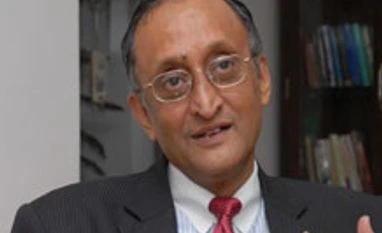West Bengal Finance and Industry Minister Amit Mitra was in the national capital — with more than six industrialists and senior officials in tow — to pitch for investment opportunities in the state and invite the business community to the Bengal Global Business Summit in January. He talks to Sudipto Dey about changing investors’ perceptions about West Bengal. Edited excerpts:
Do you find yourself fighting the perception that West Bengal is a difficult place to do business?
I think it is best to hear this from industrialists. You heard industrialists talk about their experience, their perception and the reality. The fact is that whatever is being done by industries — bringing in investments, expanding business — all this must go into the accounting system of West Bengal. With it must come macroeconomic performance and sectoral investments.
The perception comes from 34 years of gherao raj, bandh raj, capital flight — 58,000 industries were closed in West Bengal during the Left Front regime. Naturally, there is a historical baggage. I feel very strongly that we have been able to turn that around. Over ~78,000 crore of investment — I have said this in the Assembly — is under process.
More From This Section
How are you tackling man-days lost in West Bengal?
There were 78 lakh man-days lost in 2010-11, the year we assumed office. In 2012-13, it was 5,020. In 2013-14, it was zero. Chief Minister Mamata Banerjee has declared bandhs illegal. That sent a message. Then she told government employees “if you don’t come to work on the day of a bandh, a day’s salary will be deducted.” In my department of finance, attendance is generally around 80 per cent, but on a bandh day it was 94 per cent.
But, it is a multi-pronged process. One is you stop bandhs, declare strikes illegal, then start working with workers, along with industrialists.
What are the challenges of attracting investments to West Bengal?
We formulated a new industrial policy comparing it with all other states. We framed a medium and small enterprises policy, textile policy and information technology policy, and each of these policies was benchmarked with the best among states. We have got over 34 years of ruin in the state, this was the challenge. Now, we are beginning to see growth in investment across sectors.
Do you have a long-term strategy to improve work culture in West Bengal?
The chief minister sent a signal by banning strikes. That hits at the heart of the culture. She herself works 24x7. Ministers work round-the-clock. This is imbibed by the people. When I work, 10 other people also work.
Bangalore and Delhi have become hubs for start-ups. What are your plans to revive the entrepreneurial spirit in West Bengal?
Nasscom (the National Association of Software and Services Companies) came to West Bengal for a conference. As information technology minister, I was there. The meeting ended with a commitment of (setting up) 100 start-ups, for which we offered them 20,000 sq feet of space. TCS is building infrastructure for 20,000 additional employees on 40 acres of land. Cognizant has a plug-and-play facility that will give employment to 5,000 more.
You plan to double manufacturing sector’s contribution to the state GDP from the current 10 per cent. How challenging is that?
I don’t see this as a challenge, but an opportunity. We have coal, surplus electricity with 4,000 Mw in process. This will take care of power requirements for the next 15 years. If we have 4,000-5,000 Mw of power coming up over the next three to four years, this will stimulate industry. Electricity is key to manufacturing.
)